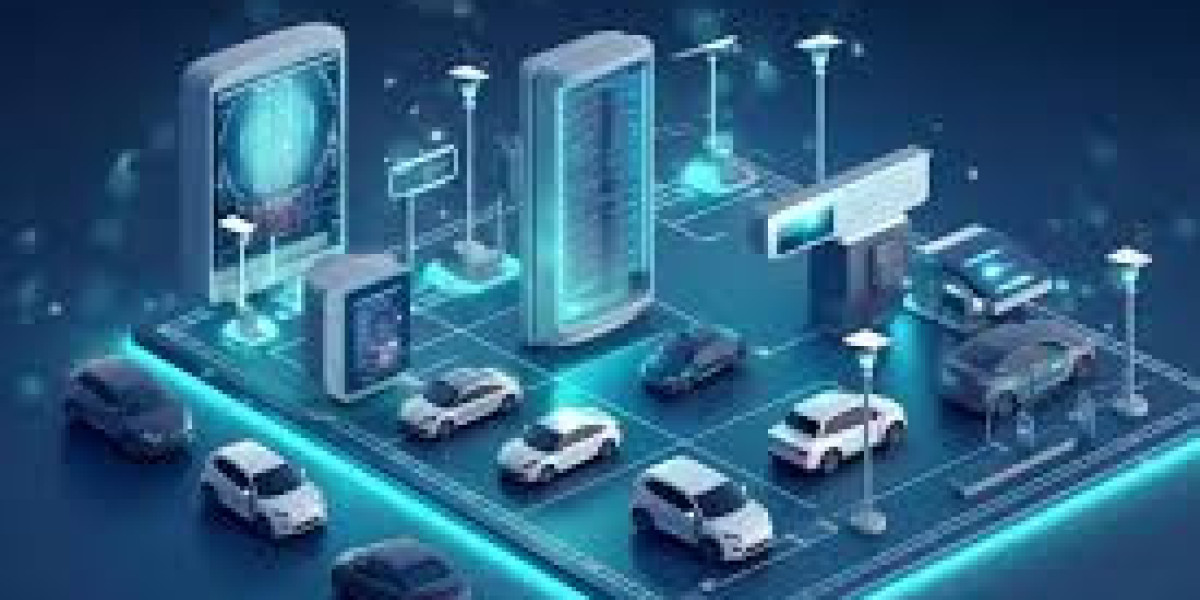Global Smart Parking Market Analysis
The Smart Parking Market is on the brink of remarkable growth, with projections indicating a surge from US$ 7.03 billion in 2023 to US$ 42.51 billion by 2032, representing a strong CAGR of 22.14% from 2024 to 2032. As urbanization accelerates and traffic congestion worsens, smart parking technologies are emerging as a key solution for managing limited parking spaces in cities worldwide. These systems integrate cutting-edge technologies such as sensors, cameras, and data analytics to offer real-time parking availability information, streamline parking operations, and improve the overall driving experience.
Request a free sample copy of the report: https://www.renub.com/smart-parking-market-p.php
What Is Smart Parking?
Smart parking refers to the use of advanced technologies to enhance the efficiency of parking management systems. By utilizing IoT (Internet of Things) devices, artificial intelligence (AI), and machine learning (ML) algorithms, smart parking systems are capable of monitoring, controlling, and optimizing parking space usage in real time. Drivers are guided to available parking spots through digital signage or smartphone apps, reducing the time spent searching for parking and minimizing congestion. These systems can also integrate payment options, reservations, and data-driven insights to provide a seamless parking experience.
The ultimate goal of smart parking is to improve urban mobility, reduce traffic congestion, cut down on CO2 emissions, and create more sustainable cities by making better use of existing infrastructure.
Key Drivers of Market Growth
1. Urbanization and Increased Vehicle Ownership
As the global urban population grows, cities are facing mounting challenges in managing traffic congestion and parking. According to the United Nations, urban areas are expected to house 68% of the global population by 2050, increasing the demand for efficient parking solutions. With more vehicles on the road, traditional parking systems are simply not enough. Smart parking addresses these issues by optimizing parking space utilization and minimizing the time drivers spend searching for parking spots, which in turn reduces congestion and air pollution.
2. Government Initiatives and Smart City Projects
Governments are increasingly recognizing the importance of smart parking systems as part of their smart city initiatives. These projects aim to address urban challenges such as traffic congestion, pollution, and inefficient use of urban space. Many cities are offering financial incentives or creating regulatory frameworks to encourage the implementation of smart parking solutions. Additionally, governments are increasingly mandating the installation of smart parking systems in newly constructed buildings and commercial facilities to ensure better urban planning and align with sustainability goals.
Public-private partnerships have also played a key role in accelerating the adoption of smart parking. By collaborating with tech companies and service providers, governments are implementing intelligent parking solutions that improve the flow of traffic, reduce congestion, and provide more accessible parking options for both private and commercial vehicles.
3. Technological Advancements
The integration of Internet of Things (IoT) technology is a game-changer in the smart parking market. IoT-enabled sensors and cameras can detect parking spot availability in real-time, while data analytics helps optimize traffic flow and parking space allocation. Additionally, advancements in AI and machine learning are enabling parking systems to predict parking demand and traffic patterns, improving the efficiency and effectiveness of parking management systems.
For instance, Aussie, a smart parking company based in Sydney, brought its innovative parking technology to the United States in 2022. The company uses real-time curbside data, such as parking limits and road laws, to create digital tools that assist cities with parking management and smart city applications. As these technologies continue to evolve, smart parking systems are expected to become even more sophisticated, providing users with real-time, data-driven insights for more efficient urban mobility.
Regional Insights: North America Leading the Charge
The North American market is expected to dominate the global smart parking sector, driven by factors such as a high adoption rate of smart technologies, growing traffic congestion, and the presence of several key players in the industry. North America’s mature infrastructure and well-established public-private partnerships are helping to propel the market’s growth. U.S. cities, in particular, are rapidly adopting smart parking solutions as part of their broader smart city initiatives.
Several large metropolitan areas, including Los Angeles, San Francisco, and New York, are already employing smart parking technologies to manage traffic flow and optimize parking availability. Public-private partnerships in cities like Chicago and Washington, D.C. are also driving the development of automated parking solutions and smart parking infrastructure, helping to make parking more efficient and accessible for residents and visitors.
Technological Trends and Future Growth
1. IoT and Real-Time Monitoring
The rise of IoT devices is central to the evolution of smart parking systems. Wireless sensors, cameras, and GPS-enabled devices are used to monitor parking spaces, track vehicle movements, and provide real-time data to both parking operators and users. This technology enables users to find available parking spots quickly and easily, while operators can better manage traffic patterns and optimize parking space allocation.
2. AI and Predictive Analytics
As AI and machine learning technologies continue to evolve, smart parking systems will become even more intelligent. Predictive analytics will allow parking systems to forecast demand and offer dynamic pricing based on factors such as location, time of day, and parking availability. Additionally, AI-powered algorithms will help cities better plan parking infrastructure by identifying patterns in parking behavior, traffic flow, and urban space utilization.
3. Seamless User Experience
The future of smart parking is focused on enhancing the user experience. Mobile apps and digital platforms will allow users to find, reserve, and pay for parking spots directly from their smartphones, making the entire parking process more efficient. Additionally, contactless payment systems and automated parking (where vehicles park themselves) are gaining popularity, offering unparalleled convenience for users.
4. Integration with Other Smart City Technologies
Smart parking systems are increasingly being integrated into broader smart city frameworks. By sharing data with other smart systems, such as intelligent traffic lights, urban mobility platforms, and electric vehicle (EV) charging stations, smart parking solutions can create a more seamless, connected urban ecosystem. This integration enables cities to optimize their infrastructure and improve the overall quality of life for residents.
Key Players in the Smart Parking Market
Several major players are leading the smart parking revolution, including:
- Siemens AG: A global leader in automation and smart infrastructure, Siemens is a key player in the development of smart parking systems that integrate with broader smart city initiatives.
- Xerox Corporation: Known for its innovations in digital printing and imaging, Xerox is also making strides in smart parking through its cloud-based parking management solutions.
- Cubic Corporation: A leader in transportation technologies, Cubic provides a variety of smart parking solutions, including automated parking guidance and management systems.
- Amano Corporation: This Japanese company is known for its automated parking systems, including ticketless parking solutions and cloud-based payment options.
- Kapsch TrafficCom AG: Kapsch offers a range of intelligent transportation and smart parking systems, with a focus on urban mobility and efficiency.
- Nedap NV: A global provider of parking management systems, Nedap focuses on making parking more efficient and accessible through smart technology solutions.
Recent News in the Smart Parking Industry
- January 2023: Robert Bosch GmbH announced its plan to equip parking garages across Germany with automated valet parking technology, enabling users to drop off their vehicles at designated points, where they will be automatically parked by an AI-driven system.
- December 2022: Raleigh-Durham International Airport partnered with TKH Group to implement an automated parking guidance system aimed at enhancing the parking experience for travelers.
- October 2022: Soldier Field in Chicago and Amano McGann Inc. collaborated to integrate new parking technologies that streamline updates and reduce maintenance costs.
- October 2022: PT PP (Persero) Tbk, a construction company based in Indonesia, joined forces with LG CNS to develop a smart city project in Indonesia's new capital, Nusantara, which will include cutting-edge smart parking systems.
Related Report :
About the Company:
Renub Research is a Market Research and Consulting Company. We have more than 15 years of experience especially in international Business-to-Business Researches, Surveys and Consulting. We provide a wide range of business research solutions that helps companies in making better business decisions. We partner with clients in all sectors and regions to identify their highest-value opportunities, address their most critical challenges, and transform their businesses. Our wide clientele comprises major players in Healthcare, Travel and Tourism, Food Beverages, Power Energy, Information Technology, Telecom Internet, Chemical, Logistics Automotive, Consumer Goods Retail, Building, and Construction, Agriculture. Our core team is comprised of experienced people holding graduate, postgraduate, and Ph.D. degrees in Finance, Marketing, Human Resource, Bio-Technology, Medicine, Information Technology, Environmental Science, and many more.
Media Contact:
Company Name: Renub Research
Contact Person: Rajat Gupta, Marketing Manager
Phone No: +91-120-421-9822 (IND) | +1-478-202-3244 (USA)
Email: mailto:rajat@renub.com








